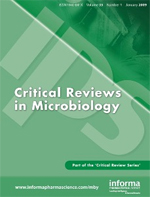 | |
| Discipline | Microbiology |
|---|---|
| Language | English |
| Edited by | Gordon Ramage, PhD |
| Publication details | |
| History | First published 1971 |
| Publisher | |
| Frequency | Quarterly |
| no | |
| 6.5 (2022) | |
| Standard abbreviations | |
| ISO 4 | Crit. Rev. Microbiol. |
| Indexing | |
| ISSN | 1040-841X (print) 1549-7828 (web) |
| Links | |
Critical Reviews in Microbiology is an international, peer-reviewed academic journal that publishes comprehensive review articles covering all areas of medical microbiology. Areas covered by the journal include bacteriology, virology, microbial genetics, epidemiology, and diagnostic microbiology. It is published by Taylor and Francis Group.
Contents
As of 2024, the impact factor is 6.0. [1]
